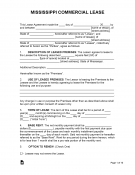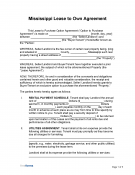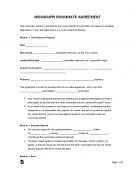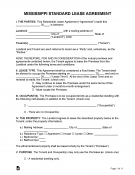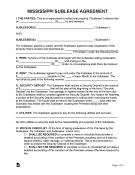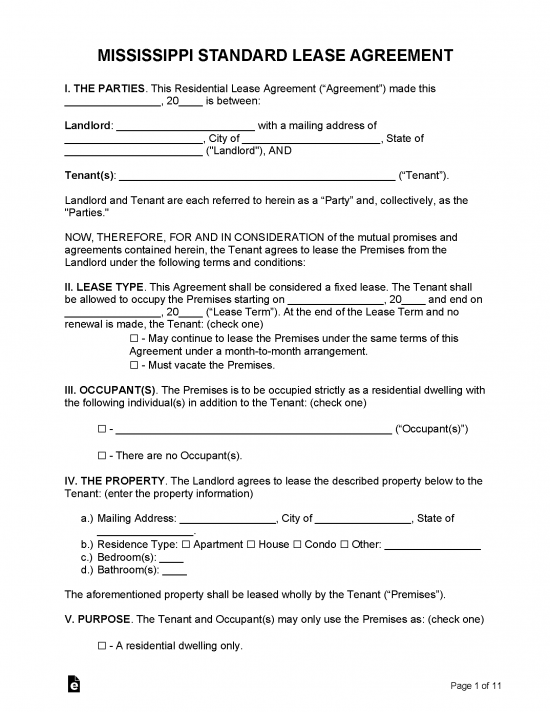Mississippi lease agreements contain the key terms of a tenant’s time in a landlord’s property, known as a tenancy. The landlord and the tenant will agree on rent, responsibility for utilities, and other obligations. Lease agreements can be valuable tools for limiting disputes between landlords and tenants because they can make clear to each party what is expected in particular situations.
Contents
By Type (6)
- Commercial Lease Agreement
- Month-to-Month Lease Agreement
- Rent-to-Own Lease Agreement
- Roommate Lease Agreement
- Standard Lease Agreement
- Sublease Agreement
Download: Adobe PDF, MS Word, Rich Text Format
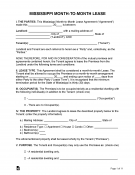 Month-to-Month Lease Agreement
Month-to-Month Lease Agreement
Download: Adobe PDF, MS Word, Rich Text Format
Download: Adobe PDF, MS Word, Rich Text Format
Download: Adobe PDF, MS Word, Rich Text Format
Download: Adobe PDF, MS Word, Rich Text Format
Download: Adobe PDF, MS Word, Rich Text Format
Landlord-Tenant Laws
Statutes – Title 89, Chapter 8 (Residential Landlord and Tenant Act)
Required Disclosures (1)
Lead-Based Paint Disclosure – For a lease of any property in which the dwelling unit was constructed prior to 1978, federal law requires landlords to disclose to tenants the risks associated with lead-based paints.
Security Deposit Laws
Maximum Amount ($)
In Mississippi, there is no maximum for what a landlord may charge as a security deposit.
Returning to Tenant
A landlord must return a tenant’s security deposit within forty-five (45) days of the termination of the tenancy. The landlord may retain a portion of the security deposit to account for owed rent, damage to the property beyond that caused by normal wear-and-tear, and other costs stemming from a tenant’s violation of the lease agreement. If the landlord does plan to retain a portion of the security deposit, the landlord must provide the tenant with a written itemization of all costs responsible for the retention, also within forty-five (45) days of the end of the tenancy. The tenant should provide the landlord with a new address for the returned funds (§ 89-8-21).
When is Rent Due? (grace period)
There is no grace period or due date for rent specified in Mississippi law, which means that the landlord and tenant put such provisions in the lease agreement.
Eviction Notice (non-payment)
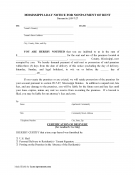 3-Day Notice to Pay or Quit – If a tenant fails to pay rent on the date it is due, then the landlord has the right to begin eviction proceedings. The landlord must post a notice on the dwelling unit, informing the tenant that he or she has three (3) days to provide the amount owed, plus late fees. The tenant has a right to contest the eviction in a hearing and may be allowed to remain on the premises until the matter is resolved (§ 89-7-27).
3-Day Notice to Pay or Quit – If a tenant fails to pay rent on the date it is due, then the landlord has the right to begin eviction proceedings. The landlord must post a notice on the dwelling unit, informing the tenant that he or she has three (3) days to provide the amount owed, plus late fees. The tenant has a right to contest the eviction in a hearing and may be allowed to remain on the premises until the matter is resolved (§ 89-7-27).
Download: Adobe PDF
Maximum Fees ($)
Late Rent Penalties
Landlords are allowed to assess late fees for late rent, but Mississippi law does not set a maximum. Any late fee should be named in the rental agreement and should be reasonable.
NSF Checks
If a tenant provides a rent check with insufficient funds available to draw on, the landlord may provide notice to the tenant and demand the amount owed plus a service charge of up to $40 (§ 97-19-57).
Tenant’s Unclaimed Property
If a tenant is evicted, Mississippi law entitles a landlord to seize and dispose of any personal property in the unit at the time of the termination of the lease (§ 89-7-35). In order to do so, the landlord must include the following language in a notice of removal (§ 89-7-31):
At the hearing, a judge will determine if the landlord is granted exclusive possession of the premises. If the judge grants possession of the premises to the landlord and you do not remove your personal property, including any manufactured home, from the premises before the date and time ordered by the judge, then the landlord may dispose of your personal property without any further legal action.
Although this is the current law, landlords may want to consider temporarily storing personal property they encounter after the end of a lease, or giving tenants the ability to take items with them during an eviction, because Mississippi’s law on tenant’s unclaimed property, arguably the harshest in the nation, is currently being challenged in federal court and may be unconstitutional (See Conner v. Alltin LLC).
